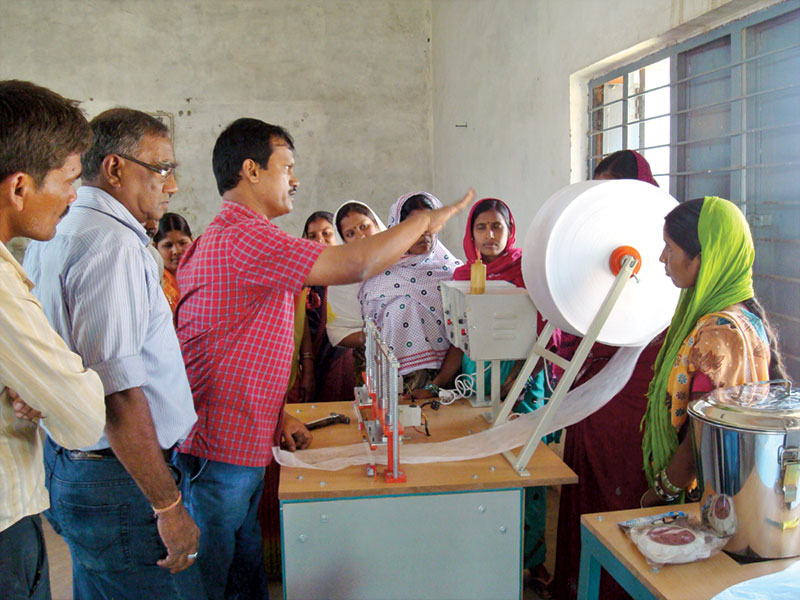Have you tried explaining to a woman from rural Bihar that she could use a decent sanitary napkin instead of rags or newspaper? “Try, as a man, to broach the subject in the presence of her husband, and he will give you strange looks and might even bash you up. But I did it,” laughs Arunachalam Muruganantham, the man who ushered in a sanitary napkin revolution in the country.

His invention of the machine to make low-cost sanitary napkins not only takes care of the personal hygiene of women, but also gives them a source of income. It also got him the Presidential award for innovation. Today, his Jayaashree Industries sells these machines to rural women in various States, delivering a package of livelihood, hygiene and dignity to them.
His journey to Bihar chronicles back to his house in a village near Coimbatore where he first saw his wife, Shanthi, hide the rags that she used while menstruating. She couldn’t afford sanitary napkins. “It was not just my wife; it was the case with all the women in the village,” he recalls. That’s when he decided to help his wife and the first thing he wanted to know was the components of the pad. “It looked like cotton wrapped in a thin cloth, so I made one for my wife. She hated it and preferred the rags.
I wondered what went wrong,” says the Padmashree recipient. The next two years he purchased sanitary napkins to understand them better. There was something he was missing out on so he began his research which included “collecting used sanitary napkins from girl students studying in local colleges.”
I wore the sanitary napkin for hours together while doing my daily chores. That’s when I found out that being a woman is not easy.
As he continued, the villagers began to think he was possessed by some evil spirit. “My friends would change directions when they saw me coming. No villager would reply to my Vanakkam and my wife would be the centre of all kinds of jokes at the village well were all the women gathered to do their daily laundry,” he says. Unable to tolerate the hurtful remarks and rude comments his mother and wife left him.
So was he upset by their decision? “It was not their fault. I don’t blame them,” was his quick reply. But the hate tweets and facebook comments on his wife have made him very unhappy. “She hails from a village and is very innocent, any woman in her place would give up on a man who spent all the money buying sanitary napkins for experiment instead of buying supplies for his home.” Shanthi now helps him in his work and takes care of things when he is out of town.
The machine

On being called India’s Menstrual Man, Muruganantham says, “it took me seven and a half years to come this far and I am happy that I am recognised this way.” After his research he developed a machine that can work on single phase electricity for 1HP drive (motor speed), can fit in a space of 3.5 metres x 3.5 metres and produces 2 napkins a minute. The technology used is non-chemical, converting high quality pine wood pulp into napkins. This time he tested his product on himself and “wore the sanitary napkin for hours together while doing my daily chores. That’s when I found out that being a woman is not easy. Meanwhile everyone in the village had decided that I was a pervert,” he laughs.
A+ for marketing
He is sceptical about advertisements for his product. “Do you run around in white pants when you have your periods just because you use a branded sanitary napkin? Those ads are selling white pants and not personal hygiene. Most big brands have beautiful faces endorsing their sanitary napkins, yet only 10 per cent of the women in the country have access to decent pads.”
When he planned to sell the machine in rural villages he decided not to patent it. He explains that “this gives his buyers a chance to take ownership of the final product and they can use their local language to promote sales.” Today there are 986 such sanitary napkin brands in India alone that are made from Muruganantham’s machine earning him the title, ‘Unilever of rural India,’ for cracking the rural market. “That’s what they call me in the UK,” he smiles.
Brands make me poor
Muruganantham lives in a 10 x 12 sq ft room. “I am happy I can see my wife cook for me, and I also help her whenever possible.” The simple man admits that even if I was from “BBC or CNN if you visit my home I will be wearing a dhoti and baniyan. You will have to sit down on the mat and drink a cup of coffee with me in a steel tumbler.”
He feels that the period of breakthrough inventions stopped in the 19th century and today “our kids are taught to invent apps,” which he terms “the silliest inventions in the history of the world. We have to teach our children to invent and innovate and not get glued to their 3.5 inch phones.” So far 32 people have replicated his machine, but this doesn’t trouble him. “If someone could simplify my machine that would be competition. Replication can’t count for competition. I am competing with Muruga (himself).”






